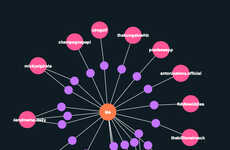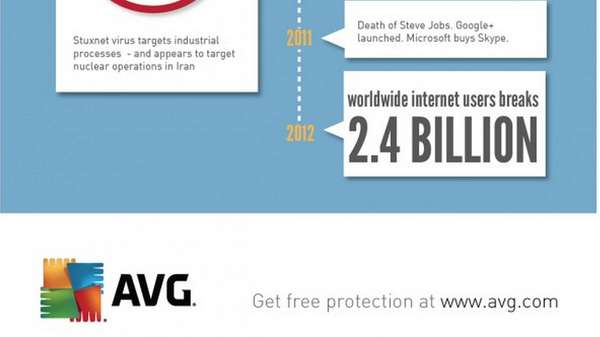
This Infographic Details the History of the Internet
Jonathon Brown — January 7, 2013 — Pop Culture
References: avg & infographicsarchive
The history of the Internet is something that often intrigues people. In 2012, the world had over 2.4 billion people using the Internet -- that equals approximately one third of the world's population. And with so many people using this amazing tool, it stands to reason there might be some curiosity about how it became what it is today. This infographic attempts to give us some insight into the Internet's journey.
In 1969 the first connection was made between the University of California Los Angeles and Stanford and Arpanet is born. In 1971 the first ever virus hit. By 1981 IBM launched the first personal computer. In 1990, the first search engine is created by a student known as 'Archie.' By 1998, the Internet had one million users. By 2005, that number ballooned to one billion. The history of the Internet continues to be written as you read this article.
In 1969 the first connection was made between the University of California Los Angeles and Stanford and Arpanet is born. In 1971 the first ever virus hit. By 1981 IBM launched the first personal computer. In 1990, the first search engine is created by a student known as 'Archie.' By 1998, the Internet had one million users. By 2005, that number ballooned to one billion. The history of the Internet continues to be written as you read this article.
Trend Themes
1. Internet Evolution - Tracking the evolution of the internet presents opportunities for entrepreneurs to innovate, create, and expand services.
2. Digital Transformation - The history of the internet is an excellent illustration of digital transformation, a potential area of innovation for businesses.
3. Global Connectivity - The growth of the internet highlights the increasing relevance of global connectivity, presenting disruptive innovation opportunities for companies who can leverage its power.
Industry Implications
1. Technology - The tech industry, from hardware to software, can grow through continuing to push the internet forward.
2. Education - Education/social media organizations have an opportunity to leverage the internet’s ability to connect people globally when providing their services.
3. Marketing and Advertising - As the internet world continues to evolve, marketers and advertisers can leverage this change in their advertising campaigns and try to innovate in a way that benefits target customers.
2.1
Score
Popularity
Activity
Freshness
























